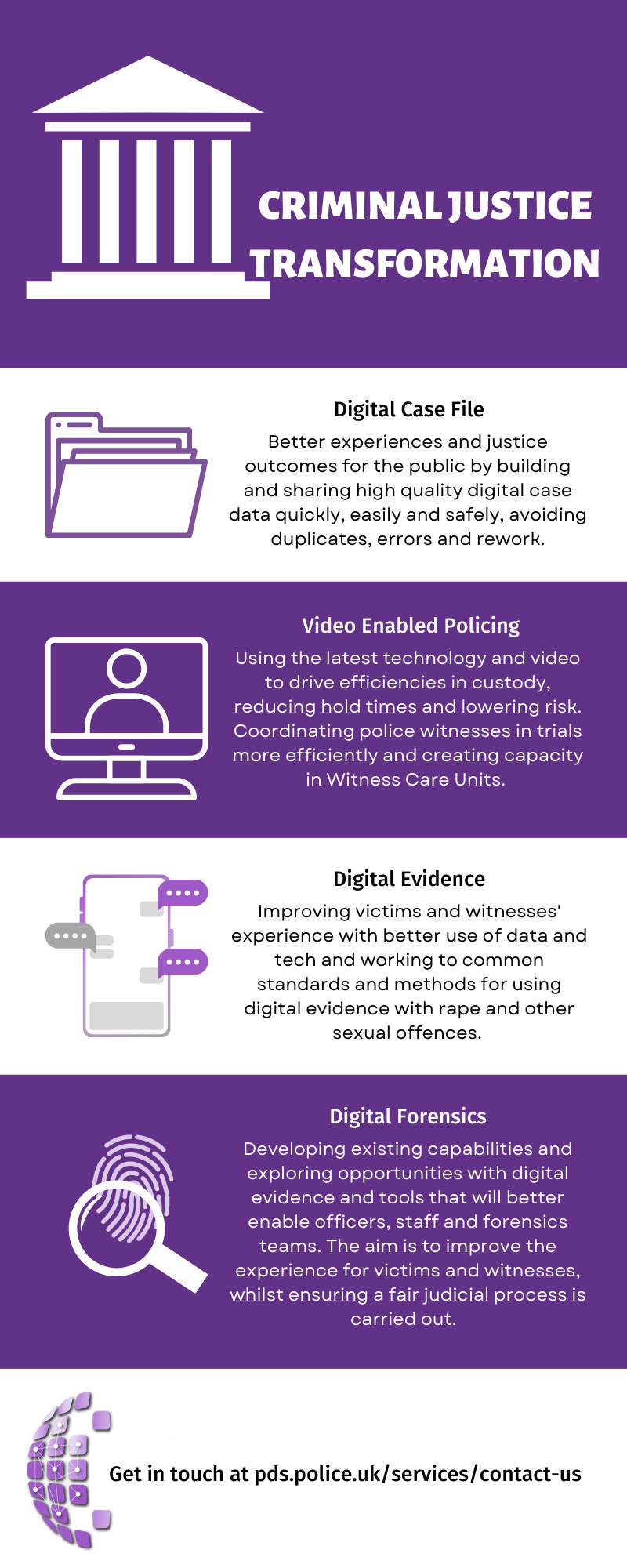Working together to improve the criminal justice system
Police forces and partners across the criminal justice system are grappling with significant pressures and challenges. There is a constant need to keep pace with and respond to changes with digital, data and technology. Often, police officers and staff are reliant on outdated and mostly manual processes, which leads to less time available and capability gaps that weigh them down in their efforts to bring criminals to justice.
The Police Digital Service’s Criminal Justice Transformation Portfolio is working together with digital and tech professionals from both the public and private sectors, policing, and criminal justice partners to tackle these issues and improve the justice journey for victims of crime. The Portfolio consists of the following programmes and projects:

Digital Case File (DCF)
The DCF is transforming the case file process through digital tools supported by nationally agreed standards and specifications that are built into the systems that forces and the Crown Prosecution Service (CPS) currently use to manage case files.
Jointly designed and developed with policing, technology business user groups and criminal justice partners, the capability will: improve the file quality and the experience of those working with cases, simplify the disclosure of evidence in court, increase efficiency and reduce time spent dealing with case files. This will ultimately result in better experiences and justice outcomes for the public.

Video Enabled Policing (VEP)
The VEP leverages existing capabilities developed through the National Enabling Programmes (NEP) to better coordinate police witnesses and support the PACE interview process.
The VEP consists of two solutions:
- The Police Witness Coordination (PWC) enables police witnesses to attend court remotely. It also provides timely trial updates and alerts for witness participation to allow officers to better manage their time, avoid unnecessary travel and return to active duty with minimal delay or disruption.
- The PACE Interview Coordination (PACE-IC) provides video and tech for scheduling, coordinating, and conducting remote video PACE interviews. Using video and automation, policing and criminal justice partners will be able to work more efficiently, freeing time and space in the Witness Care Units.

Digital Evidence (DEP)
The Digital Evidence Programme (DEP) was initiated in response to the government End-to-End Rape Review and supports the work led by the National Police Chiefs’ Council (NPCC) portfolio for Adult Sexual Offences and Rape. The Programme is seeking to establish common standards and methods for using digital evidence with rape and serious sexual offences (RASSO). It is also exploring how digital, data and technology; can better enable officers and staff involved in investigating these types of crimes.
DEP’s main objective is to minimise privacy intrusion and improve victims’ and witnesses’ experience whilst ensuring a fair judicial process is carried out. The Programme’s ambition is to help officers and staff solve some crucial issues linked to RASSO cases. These include: facilitating the selective extraction of digital data from devices for analysis and then subsequent use in court. All of this work should help to improve the journey to justice for those involved in RASSO cases.
DEP team is working in partnership with Operation Soteria Bluestone, PDS’s Digital Forensics Programme (DFP) and the Forensics Capability Network (FCN).

Digital Forensics (DFP)
The DFP is working in partnership with the NPCC portfolio for Digital Forensics, as well as technology suppliers, and the forensic science community. The programme is developing a range of services for critical digital forensics capabilities, building on and progressing the work of Transforming Forensics and the Forensics Capability Network.
The DFP will focus on the following key areas of work:
- Selective extraction & examination – to identify the current and future technology requirements for forces relating to selective extraction and examination of digital media.
- Automation – to drive adoption of automation across Digital Forensics (DF).
- Validation services – to define the strategy and scope for national DF validation, as well as stand up a suite of validation services for policing.
- Enduring capability – to develop a sustainable operating model for the future identification, evaluation, procurement and delivery of digital evidence technology capabilities.
- Rape Review Response Project (phase two) – the programme is also supporting a further round of funding to deliver state-of-the-art mobile digital forensics kit to police forces to support investigations.
To learn more about PDS’s Criminal Justice Transformation Portfolio, get in touch with us via our Contact form.





